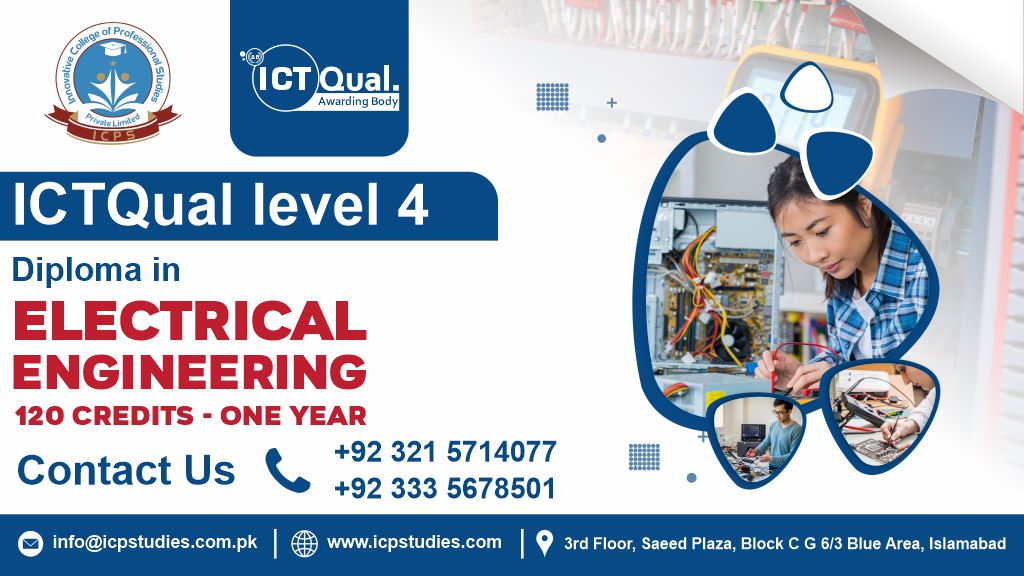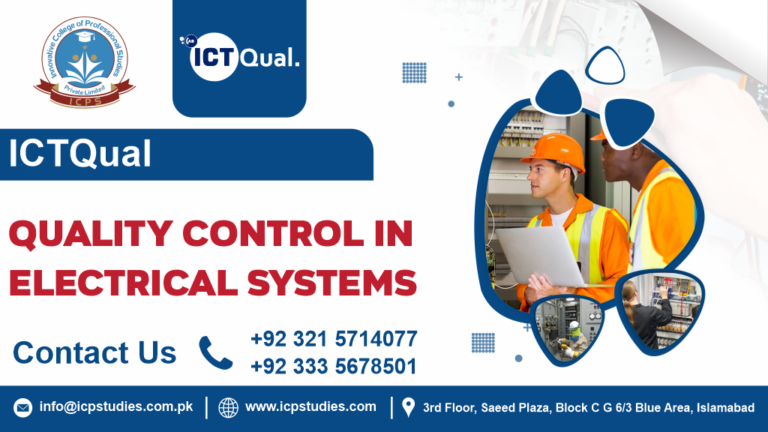Are you ready to take your electrical engineering career to the next level? The ICTQual Level 4 Diploma in Electrical Engineering (120 Credits) is an advanced qualification designed to provide in-depth knowledge and specialized skills needed to excel in the electrical engineering industry. Spanning one year, this course is ideal for individuals who are ready to tackle complex engineering challenges and want to enhance their professional expertise.
The ICTQual Level 4 Diploma in Electrical Engineering (120 Credits) is an intensive, one-year program that builds on foundational electrical engineering knowledge and delves deeper into advanced topics. It offers 120 credits of focused learning, providing both theoretical insights and practical applications to prepare students for high-level roles in the electrical engineering sector.
Throughout this year-long course, students will explore advanced electrical principles, power systems, renewable energy technologies, electrical control systems, and complex troubleshooting techniques. The program is designed to provide the expertise required to design, manage, and maintain sophisticated electrical systems in various industries.
The ICTQual Level 4 Diploma in Electrical Engineering (120 Credits) offers a comprehensive, industry-focused education designed to prepare you for high-level roles in the electrical engineering field. With its blend of advanced theory and practical application, this one-year course equips you with the skills and expertise needed to tackle complex electrical systems, drive innovation in renewable energy, and manage large-scale engineering projects. Whether you’re looking to move into senior positions or further specialize in your career, this diploma provides the foundation for long-term success in the ever-evolving electrical engineering industry.
All About ICTQual Level 4 Diploma in Electrical Engineering 120 Credits – One Year
Course Overview
The ICTQual Level 4 Diploma in Electrical Engineering (120 Credits) is a comprehensive, one-year program designed for individuals looking to advance their knowledge and expertise in electrical engineering. This advanced qualification builds upon foundational electrical principles and dives into specialized topics like electrical power systems, control and automation, renewable energy technologies, and complex fault diagnosis.
Throughout the course, students will gain hands-on experience and theoretical knowledge necessary to tackle complex challenges in electrical systems design, installation, and maintenance. The curriculum is tailored to meet the needs of the modern electrical engineering industry, ensuring students are well-equipped to take on leadership roles or further specialization.
By the end of this course, graduates will be prepared to manage sophisticated electrical projects, design efficient power systems, integrate renewable energy solutions, and implement advanced automation technologies. Whether you’re aiming for senior positions in electrical engineering or seeking to specialize in cutting-edge areas such as smart grids and sustainable energy, the ICTQual Level 4 Diploma will provide you with the technical skills and industry-recognized qualifications needed to thrive in this dynamic field.
Study Units
- Electrical Principles
- Electrical Circuits and Systems
- Digital Electronics and Microprocessors
- Electrical Machines and Transformers
- Instrumentation and Control Systems
- Power Generation and Distribution
- Renewable Energy Systems
- Electrical Safety and Legislation
- Advanced Electrical Circuit Design
- Control and Automation Systems
- Project Management for Electrical Engineering
- Electrical Engineering Project (Capstone)
To enroll in the ICTQual Level 4 Diploma in Electrical Engineering (120 Credits), applicants should meet the following entry requirements:
- Minimum Age: 18 years old.
- Educational Background:
- A Level 3 qualification in Electrical Engineering or a related field (such as a Level 3 Diploma or an equivalent technical qualification).
- Alternatively, applicants with a relevant industry background or significant practical experience in electrical systems may also be considered for entry, provided they can demonstrate proficiency in key areas such as electrical design, installation, and maintenance.
- Basic Math and Science Knowledge: A good understanding of mathematics (especially algebra, trigonometry, and basic calculus) and physics is essential, as the course includes advanced electrical theory and circuit analysis.
- English Language Proficiency: Applicants must have a sufficient command of the English language to understand course materials, complete assignments, and communicate effectively in technical environments.
- Practical Experience (Optional but Beneficial): Practical experience in an electrical engineering or technical role is highly recommended but not mandatory. It can help in understanding the real-world applications of theoretical concepts covered in the course.
If you meet these criteria and have a passion for advancing your career in electrical engineering, this Level 4 diploma will help you further develop your skills and knowledge in the field.
The ICTQual Level 4 Diploma in Electrical Engineering (120 Credits) is ideal for:
- Experienced Electrical Technicians: Individuals with a foundational understanding of electrical systems who wish to deepen their knowledge and advance to more specialized or senior roles in the electrical engineering industry.
- Aspiring Electrical Engineers: Those who have completed a Level 3 qualification or equivalent in electrical engineering and wish to pursue higher-level education and career advancement in electrical design, systems engineering, or project management.
- Career Changers: Professionals from other engineering or technical fields who are looking to transition into electrical engineering and gain specialized knowledge in areas such as power systems, control, and automation.
- Electrical Engineers Seeking Professional Development: Engineers who wish to enhance their expertise in advanced topics such as renewable energy, smart grids, automation, and complex troubleshooting, opening doors to leadership positions.
- Individuals Interested in Renewable Energy: Those looking to specialize in sustainable energy solutions, including solar, wind, and other renewable energy technologies, and integrate these systems into modern power grids.
- Students with a Strong Technical Background: Anyone with a solid understanding of electrical systems, mathematics, and science, and who is eager to explore advanced engineering principles and technologies.
This course is designed for individuals looking to enhance their professional qualifications, step into more advanced roles, and lead projects in the rapidly evolving electrical engineering sector.
Learning Outcomes
Year 1: Foundation and Core Engineering Principles
- Mathematics for Engineering
- Master foundational mathematical techniques necessary for solving engineering problems.
- Apply calculus, algebra, and trigonometry to real-world engineering contexts.
- Engineering Principles
- Understand and apply fundamental engineering concepts, such as forces, motion, and energy.
- Build a strong foundation in engineering mechanics and systems analysis.
- Materials Science and Engineering
- Develop knowledge of the properties, behavior, and selection of materials used in mechanical engineering.
- Analyze the suitability and performance of materials for various engineering applications.
- Engineering Drawing and CAD
- Learn to create and interpret technical engineering drawings.
- Acquire proficiency in Computer-Aided Design (CAD) software to model mechanical systems.
- Statics and Dynamics
- Apply principles of static and dynamic analysis to engineering problems.
- Solve for forces, moments, and motion in mechanical systems.
- Introduction to Thermodynamics
- Understand the basic laws and principles of thermodynamics in mechanical engineering.
- Analyze energy transformations and heat transfer within mechanical systems.
- Manufacturing Processes
- Gain knowledge of key manufacturing techniques such as casting, machining, and welding.
- Understand how these methods apply to the production of mechanical components.
- Fluid Mechanics
- Study fluid properties and behavior, including fluid flow.
- Apply fluid mechanics principles to solve practical engineering problems.
- Electrical and Electronic Systems for Engineers
- Understand basic electrical systems, circuits, and components.
- Learn how electrical and electronic systems integrate with mechanical engineering applications.
- Engineering Mathematics for Design
- Apply advanced mathematical methods to solve design challenges in mechanical systems.
- Use mathematical modeling techniques to analyze and optimize mechanical designs.
- Mechanical Design Fundamentals
- Understand key principles of mechanical design, including material selection and stress analysis.
- Develop skills to design mechanical components and systems for various applications.
- Engineering Project Management
- Learn the fundamentals of project management, including planning, risk assessment, and resource allocation.
- Understand how to effectively manage engineering projects to ensure successful outcomes.
Year 2: Advanced Engineering Concepts and Applications
- Advanced Thermodynamics
- Build on basic thermodynamics knowledge by studying advanced thermodynamic cycles and energy systems.
- Apply thermodynamic principles to analyze and design energy-efficient systems.
- Strength of Materials
- Analyze the mechanical strength and deformation of materials under various loading conditions.
- Apply principles of stress, strain, and failure analysis to real-world engineering problems.
- Heat Transfer and Fluid Dynamics
- Study the mechanisms of heat transfer and fluid flow in mechanical systems.
- Solve complex engineering problems involving heat transfer and fluid dynamics.
- Advanced Manufacturing Techniques
- Learn cutting-edge manufacturing methods such as CNC machining, additive manufacturing, and robotics.
- Understand the benefits and challenges of these techniques in the manufacturing industry.
- Mechanical Vibrations and Acoustics
- Analyze mechanical vibrations, resonance, and their effects on system performance.
- Apply acoustic principles to control noise and vibration in mechanical designs.
- Engineering Dynamics and Control
- Understand the behavior of dynamic systems and apply control theory to maintain system stability.
- Design control systems to optimize mechanical system performance.
- Design and Analysis of Machine Elements
- Design and analyze key machine elements such as gears, shafts, and bearings.
- Understand the operational principles and performance characteristics of these components.
- Control Systems for Mechanical Engineering
- Apply control theory to the design and optimization of mechanical systems.
- Develop feedback control mechanisms to enhance system stability and efficiency.
- Engineering Materials and Failure Analysis
- Study material failure mechanisms such as fatigue, fracture, and corrosion.
- Conduct failure analysis to improve mechanical system reliability.
- Computer-Aided Engineering (CAE)
- Develop proficiency in using CAE tools for simulation, modeling, and design validation.
- Apply techniques like Finite Element Analysis (FEA) and Computational Fluid Dynamics (CFD) in mechanical design.
- Mechanical System Design
- Design and optimize mechanical systems by considering performance, safety, and cost.
- Solve system-level engineering challenges through comprehensive analysis and design.
- Project Planning and Cost Estimation
- Master techniques for estimating costs and managing project timelines.
- Develop the ability to allocate resources and plan for the successful completion of engineering projects.
Year 3: Specialization and Practical Application
- Advanced Mechanical System Design
- Apply advanced design principles to create complex mechanical systems.
- Incorporate optimization techniques to improve system efficiency and performance.
- Energy Systems and Sustainability
- Study sustainable energy systems and renewable energy technologies within mechanical engineering.
- Design energy-efficient systems with a focus on minimizing environmental impact.
- Advanced CAD and 3D Modeling
- Gain expertise in advanced CAD tools for 3D modeling and simulation.
- Create detailed models and prototypes of mechanical systems.
- Finite Element Analysis (FEA) for Mechanical Engineers
- Master FEA techniques to analyze and optimize mechanical structures.
- Solve complex structural problems involving stress, strain, and deformation.
- Advanced Manufacturing and Robotics
- Study advanced manufacturing techniques and explore the integration of robotics in production processes.
- Apply automation and robotics to optimize manufacturing systems.
- Mechatronics and Automation
- Understand the integration of mechanical, electrical, and control systems to create automated systems.
- Design mechatronic systems for industrial and commercial applications.
- Engineering Research Methodology
- Develop research skills to investigate engineering problems and propose solutions.
- Learn how to conduct experiments, analyze data, and present findings professionally.
- Industrial Engineering and Process Optimization
- Apply industrial engineering techniques to optimize manufacturing processes and improve efficiency.
- Analyze workflows to reduce costs and increase productivity.
- Design for Manufacturability
- Learn how to design systems with manufacturability and cost-effectiveness in mind.
- Optimize designs for ease of production and reduced manufacturing costs.
- Professional Practice in Mechanical Engineering
- Understand the ethical, professional, and regulatory responsibilities of mechanical engineers.
- Gain skills in navigating industry standards, regulations, and effective communication within the workplace.
- Engineering Innovation and Entrepreneurship
- Explore innovation and entrepreneurship opportunities in the engineering field.
- Develop the skills necessary to bring new engineering solutions and products to market.
- Capstone Project/Thesis
- Apply the knowledge acquired throughout the program to complete a comprehensive engineering project or research thesis.
- Demonstrate the ability to solve real-world engineering challenges and present findings in a professional manner.
FAQs about ICTQual Level 4 Diploma in Electrical Engineering 120 Credits – One Year







